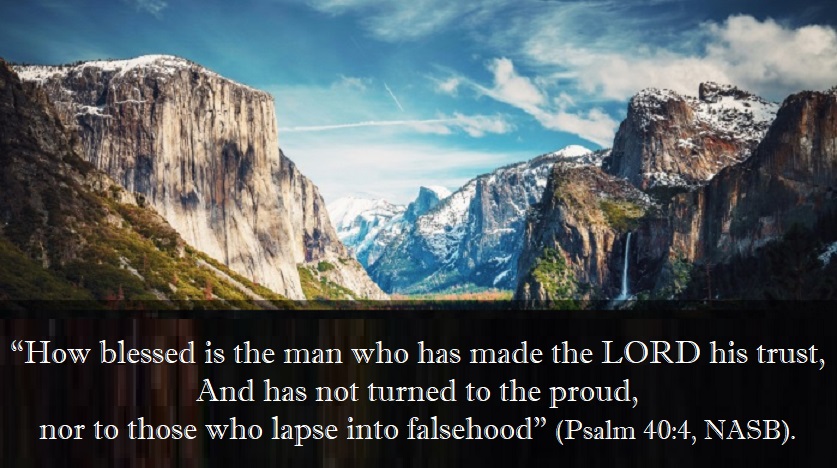“Go therefore and make disciples of all the nations…teaching them to observe all that I commanded you; and lo, I am with you always, even to the end of the age” (Matthew 28:19-20, NASB).
——————–
Contents:
1) Remember Shiloh! Jeremiah 7:1-7 (Jon W. Quinn)
2) What Would You Do? (Wayne Goff)
——————-

-1-
Remember Shiloh!
Jeremiah 7:1-7
Jon W. Quinn
In the days of Jeremiah (ca. 600 B.C.), the people of Judah faced difficult times. The northern kingdom of Israel was history, taken into Assyrian captivity. Nebuchadnezzar, king of Babylon, had defeated Assyria, and was making his way into Judah.
The people of Judah had developed a false trust. They were placing their confidence and hopes everywhere but the place where it would have done them some good. It is through the prophet Jeremiah that the Lord condemns as useless the false hopes created in the hearts of the people of Judah by the leaders.
It is still possible today to put our hope and confidence in the wrong place. We would do well to avoid making the same critical mistake as Judah did. We read of that false trust and how Jehovah responded to it in the seventh chapter of Jeremiah.
The False Trust of Judah
First, the people placed their confidence in the temple buildings themselves (vss. 1-7). The Lord responded, “Do not trust in deceptive words, saying, ‘This is the temple of the LORD, the temple of the LORD, the temple of the LORD’” (Jeremiah 7:4).
The people were under the impression that the mere fact that the temple was located in Jerusalem would spare the city. The Lord sent Jeremiah to the temple itself to preach that it would take genuine repentance to reverse the situation (Jeremiah 7:1-7).
Then, as now, the Lord required more than rituals involving temple worship and outward piety. Repentance would mean not only true-hearted worship of the Lord, but also a change in how the people treated one another; that their dealings were to be just and honorable and without oppression.
Second, they sought to excuse their obvious sins (Jeremiah 7:8-11). Again, theirs was a false trust in that they were being led to think that they could sin and not be held accountable. “Behold, you are trusting in deceptive words to no avail” (Jeremiah 7:8). After committing transgression, they would go to the temple thinking that would absolve them: “…then come and stand before Me in this house, which is called by My name, and say, ‘We are delivered!’ — that you may do all these abominations?” (Jeremiah 7:10). The Lord could see through such hypocrisy and responds by saying that this, too, is a false hope. He says, “Remember Shiloh!” (Jeremiah 7:12).
Shiloh is where the tabernacle had stood before the temple had been built at Jerusalem, and was at that time the center of the worship unto Jehovah (Joshua 8:1). The ark of the covenant was there. Somehow, the people had gotten the idea that if the ark was physically present with them, that they were invincible. They were not faithful to the Lord in their conduct and service, but they had the “magical” ark, so they would prevail in battle against the Philistines.
They were wrong about that. It was at Shiloh where the ark of the covenant had been captured by the Philistines and the unfaithful people of Israel defeated (1 Samuel 4:10-11). It was as if they believed that the ark was like a lamp and God was a genie inside enslaved to whoever possessed the ark. That was certainly a mistake.
Jeremiah warns that God would do likewise with Jerusalem and the temple (Jeremiah 7:13-15). That is, just as He had withdrawn His protection from Shiloh and allowed the ark to be captured, He would withdraw His protection from the temple and allow it to be captured as well. This because of Judah’s failure to heed His prophets – (vs. 13).
Similar False Trust Today
Could we have a false trust as “members” of the church which Christ built? Are some like the Judeans who cried “The Temple of the Lord…” but did not give themselves fully and loyally to the Lord and His service? There may be those who cry “The Church of Christ…” behaving as if membership will cover over negligence and inactivity. It may be that some think as long as they are members of a faithful church that they are secure. But the Bible says that judgment begins with the household of God (1 Peter 4:17) and the parable of the tares also tells us that such attitudes are misguided (Matthew 13:41-43).
The fact is, salvation is dependent on individual faith and loyalty, not by the crowd with whom we may be associated. While it is true that our associates may have an effect on what kind of character we develop, each one of us will be judged as an individual and not by group allegiance or association! – “For we must all appear before the judgment seat of Christ, so that each one may be recompensed for his deeds in the body, according to what he has done, whether good or bad” (2 Corinthians 5:10).
Do some, like the Judeans, who disobeyed God, then claimed exemption, do likewise today? Living in and of the world part of the time, and then going to “church”? Do we find ourselves participating in worldliness in our manner of speech, conduct and/or style of dress but think of ourselves as being “faithful members” because we “go to church” the way they went to the temple?
Today, as then, God is a God of grace, but his grace instructs us to live holy (Titus 2:11,12). There is no sacrifice made for those who willfully transgress God’s law (Hebrews 10:23-31). Salvation is dependent upon God’s grace, not church ritual!
The Lord responded to the folly of such a false trust: As they were once told, “Remember Shiloh!” let us “Remember Sardis!” (Revelation 3:1-6). They had “a living name,” but that did not free them from the threat of condemnation – (vss. 1-3). As always, salvation was based on individual consecration (vss. 4-6).
To the folly of such a false trust we could also answer: “Remember Laodicea!” (Revelation 3:14-22). They had become “lukewarm” – (vss. 14,15). They were in danger of expulsion because of worldliness – (vss. 16,17 ). They were in need of repentance; full and complete repentance ( vss. 18-22).
Like Judah whose salvation from destruction depended upon wholehearted service to God, so our salvation depends on complete and faithful obedience to the will of Christ! We must avoid the fallacy of “virtue by association,” and remember that God has promised to do to us just as He did to Israel if we are not faithful – (see Romans 11:20-22). This is a call to personal commitment and endeavor. It is not enough to be associated with the faithful… each of us must become one of God’s faithful.
Note: Many thanks to my friend Mark Copeland for doing a sermon outline upon which many of the thoughts in this article are based.
— Via Expository Files 13.3; March 2006
——————–

-2-
What Would You Do?
Wayne Goff
In studying the book of Isaiah, it is fascinating to study the psychological conflict between Judah’s good King Hezekiah and Assyria’s idolatrous, worldly-wise King Sennacherib (2 Chron. 32; Isaiah 36-37).
Sennacherib had already defeated most of Judah’s fortified cities and was laying siege to Lachish when he sent his ambassadors to Jerusalem to demand an unconditional surrender. His persuasive arguments were designed to destroy any faith or hope in winning the battle against Assyria. Systematically he tried to cast down every vestige of hope: (1) Your God will not deliver you from Assyrian siege; (2) King Hezekiah destroyed the altars and high places of worship to God; (3) What other nations or gods have kept me from defeating them? (4) He even lied and said that Jehovah had sent Assyria to punish Judah. (5) Sennacherib offered to transplant the Jews to a foreign land much like their own native country.
Now, dear reader, place yourself in Jerusalem at this time (ca. 700 B.C.) and ask yourself what you would do. A world power has come up against your nation and has defeated almost every other fortified city except yours. This powerful nation is vicious, cruel and heartless in their military ways. Your nation and king seem physically helpless against these great odds. Would you surrender?
First, King Hezekiah fortified Jerusalem as best he could (2 Chron. 32:5ff). Then he encouraged his people with remarkable words of faith in this dark hour: “Be strong and courageous; do not be afraid nor dismayed before the king of Assyria, nor before all the multitude that is with him; for there are more with us than with him. With him is an arm of flesh; but with us is the LORD our God, to help us and to fight our battles” (2 Chron. 32:7-8).
The faith of Hezekiah led him to see the vast heavenly host and the God of heaven above the great Assyrian army and its King Sennacherib.
THE RESULTS? God struck dead 185,000 Assyrian soldiers overnight (Is. 37:36)! Every mighty man of valor, leader and captain was killed (2 Chron. 32:21)
THE LESSON? “…Greater is He that is in you, than he that is in the world” (1 Jn. 4:4). So fight your spiritual battles with confidence!
— Via Roanridge Reader, June 12, 2011
——————–
The Steps That Lead to Eternal Salvation
1) Hear the gospel — for that is how faith comes (Rom. 10:17; John 20:30-31).
2) Believe in the deity of Jesus Christ, the Son of God (John 8:24; John 3:18).
3) Repent of sins. For every accountable person has sinned (Romans 3:23; Romans 3:10), which causes one to be spiritually dead (Ephesians 2:1) and separated from God (Isaiah 59:1-2; Romans 6:23). Therefore, repentance of sin is necessary (Luke 13:5; Acts 17:30). For whether the sin seems great or small, there will still be the same penalty for either (Matt. 12:36-37; 2 Cor. 5:10) — and even for a lie (Rev. 21:8).
4) Confess faith in Christ (Rom. 10:9-10; Acts 8:36-38).
5) Be baptized in water for the remission of sins (Mark 16:16; Acts 2:38; 22:16; 1 Pet. 3:21). This is the final step that puts one into Christ (Gal. 3:26-27). For from that baptism, one is then raised as a new creature (2 Cor. 5:17), having all sins forgiven and beginning a new life as a Christian (Rom. 6:3-4). For the one being baptized does so “through faith in the working of God” (Col. 2:12). In other words, believing that God will keep His word and forgive after one submits to these necessary steps. And now as a Christian, we then need to…
6) Continue in the faith by living for the Lord; for, if not, salvation can be lost (Matt. 24:13; Heb. 10:36-39; Rev. 2:10; 2 Pet. 2:20-22).
——————–
Tebeau Street
CHURCH OF CHRIST
1402 Tebeau Street, Waycross, GA 31501
Sunday: 9 a.m. Bible Classes and 10 a.m. Worship Service. We also have a Song Service at 5 p.m. for every first Sunday of the month.
Wednesday: 7 p.m. Bible Classes
evangelist/editor: Tom Edwards (912) 281-9917
Tom@ThomasTEdwards.com
https://thomastedwards.com/go/all.htm (This is a link to the older version of the Gospel Observer website, but with bulletins going back to March 4, 1990.)